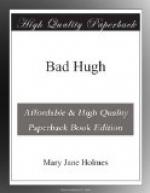Adah felt as if she should sink beneath the cold, cruel scrutiny to which she knew she was subjected by the woman on her right and the woman on her left. Too much confused to remember anything distinctly, Adah forgot Jim’s injunction; forgot that Pamelia was to arrange it somehow; forgot everything, except that Mrs. Richards was waiting for her to speak. An ominous cough from Eudora decided her, and then it came out, her reason for being there. She had seen Miss Anna’s advertisement, she wanted a place, and she had come so far to get it; had left a happy home that she might not be dependent but earn, her bread for herself and her little boy, for Willie. Would they take her message to Anna? Would they let her stay?
“You say you left a happy home,” and the thin, sneering lips of Eudora were pressed so tightly together that the words could scarcely find egress. “May I ask, if it was so happy, why you left it?”
There was a flush on Adah’s cheek as she replied, “Because it was a home granted at first from charity. It was not mine. The people were poor, and I would not longer be a burden to them.”
“And your husband—where is he?”
This was the hardest question of all, and Adah’s distress was visible as she replied, “I will be frank with you. Willie’s father left me, and I don’t know where he is.”
An incredulous, provoking smile flitted over Eudora’s face as she returned, “We hardly care to have a deserted wife in our family—it might be unpleasant.”
“Yes,” and the old lady took up the argument, “Anna is well enough without a maid. I don’t know why she put that foolish advertisement in the paper, in answer, I believe, to one equally foolish which she saw about ‘an unfortunate woman with a child.’”
“I am that woman. I wrote that advertisement when my heart was heavier than it is now, and God took care of it. He pointed it out to Miss Anna. He caused her to answer it. He sent me here, and you will let me see her. Think if it were your own daughter, pleading thus with some one.”
“That is impossible. Neither my daughter, nor my daughter-in-law, if I had one, could ever come to a servant’s position,” Mrs. Richards replied, not harshly, for there was something in Adah’s manner and in Adah’s eyes which rode down her resentful pride; and she might have yielded, but for Eudora, whose hands had so ached to shake the little child, now innocently picking at a bud.
How she did long to box his ears, and while her mother talked, she had taken a step forward more than once, but stopped as often, held in check by the little face and soft blue eyes, turned so trustingly upon her, the pretty lips once actually putting themselves toward her, as if expecting a kiss. Frosty old maid as she was, Eudora could not harm that child sitting on her embroidery as coolly as if he had a right; but she could prevent her mother from granting the stranger’s request; so when she saw signs of yielding, she said, decidedly, “She cannot see Anna, mother. You know how foolish she is, and there’s no telling what fancy she might take.”




